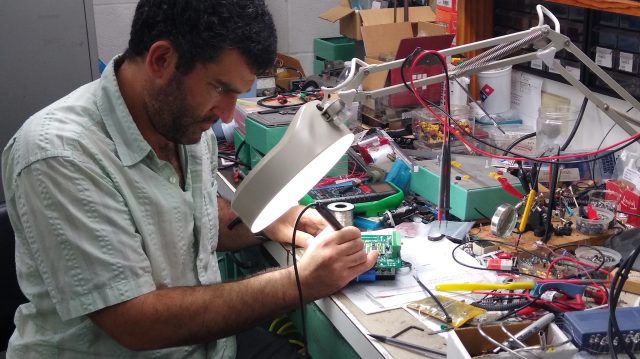
Barry Muldrey, assistant professor of electrical engineering, at work in his laboratory in preparation for fall classes at UM. Submitted photo
Barry Muldrey’s interest in music connected him with a career in engineering and electronics.
“I remember meeting with a professor at UNO (the University of New Orleans) to discuss my ideas for reconfiguring my electric guitar,” said Muldrey, who is the newest assistant professor of electrical engineering at the University of Mississippi.
“My musical interests led me to work at a recording studio in New Orleans, where I earned a reputation for being ‘good with electronics,’ resuscitating vintage equipment. It was at about this time I began to realize I might have a brighter future in engineering than in music.”
After completing his bachelor’s degree at UNO, the New Orleans native attempted to launch a startup, manufacturing professional recording equipment.
“We had a good idea, but the financing we pursued didn’t match the size of the market we were after,” Muldrey said. “Beyond that experience, I’ve worked in oil and gas, for a medical device startup, for Intel Corp. doing research and for a rapid-prototyping/product design startup.”
Muldrey earned his master’s and doctoral degrees from the Georgia Institute of Technology. This fall, he will teach the course Testing of Computing Systems, which will introduce concepts and techniques involved in evaluating designs and measuring design performance as well as implementing quality control in volume production of computer chips.
In the spring, Muldrey will teach a course on realtime embedded systems in which students will learn to build self-regulating robotic systems.
“My research interest focuses around the ideas of ‘safety’ and ‘robustness’ in the electronic systems we build today,” Muldrey said. “From the most basic individual chips to global networks of machines, our complex systems’ behaviors have outpaced our ability to predict them. Yet, we know that somehow our systems must be capable of gracefully handling unforeseen and unanticipated interactions and failures.”
Muldrey said he plans to learn to build fun online learning environments and strong relationships with students despite the limitations imposed by COVID-19.
“If I can make my courses engaging and dynamic in a remote setting, I’m very optimistic about returning to the classroom,” he said. “My long-term goal is to develop ways to integrate electrical and computer engineering education into our communities in ways that yield compounding benefits.”
Muldrey said a repair clinic, for example, would be a great way for students to learn about designing, debugging and repairing electronics while providing a valuable service to the community and introducing the discipline to young people.
“To achieve these goals, my plan is to rapidly pick up already-learned lessons from my colleagues in the department and elsewhere,” Muldrey said. “I was recently in touch with famous math YouTuber ‘3Blue1Brown’ to discuss some of the techniques he used in his successful ‘Lockdown Math’ series, which included his first live and interactive broadcasts.”
Muldrey is a welcome addition to the department faculty, said Ramanarayanan Viswanathan, chair and professor of electrical and computer engineering.
“Barry comes to us from Georgia Tech after gaining considerable experience in testing of very large-scale integrated circuits,” Viswanathan said. “He formulated procedures using machine learning algorithms that can be used during the design phase as well as fabrication testing.
“He has novel ideas for developing engaging online materials and to teach design and theory through repair and troubleshooting of electronic components and systems. We are excited that he will be strengthening our computer engineering program in both research and education.”
Sharing is the most rewarding part of teaching, Muldrey said.
“Sharing the excitement of a particular topic, tool or technique, sharing the workload while building something ambitious and sharing the pride of challenges overcome,” he said.
Muldrey said his most gratifying achievements have been his successful open-source software projects.
“Many research tools and components were built out of my personal necessity in the course of accomplishing something else, and many of those have been published in hopes of saving another researcher the trouble of building it from scratch,” he said.
“Often, I receive emails from other engineers, thanking me for publishing the tool. One such email may soon lead to an industrial research partnership with an RF (radio frequency) chip manufacturer.”
Muldrey and his wife, Ashley, lived in Atlanta before their recent move to Oxford.